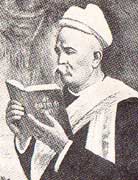|

|
Alphabetical Order
|

|
|
|
 In Bombay, Justice Mahadev Govind Ranade (1841-1901) graduated from Elphinstone College in Bombay and became a teacher and journalist. Like so many other young men of his generation, he questioned the customs and beliefs of his society. In 1869 Ranade joined the Widow Remarriage Association, and in 1870 the Prarthana Samaj. At first, he and his colleagues were engaged in "intellectual protest against superficial dogmas untenable for a rational mind," but later they became more interested in social action.
In Bombay, Justice Mahadev Govind Ranade (1841-1901) graduated from Elphinstone College in Bombay and became a teacher and journalist. Like so many other young men of his generation, he questioned the customs and beliefs of his society. In 1869 Ranade joined the Widow Remarriage Association, and in 1870 the Prarthana Samaj. At first, he and his colleagues were engaged in "intellectual protest against superficial dogmas untenable for a rational mind," but later they became more interested in social action.
In 1871 Ranade was made a judge in Poona where he joined a group of committed social reformers intent on achieving real change. Soon after he had received this appointment his wife of almost twenty years died. Social reform colleagues expected he would marry a widow. But Ranade's father, anticipating this disaster, moved quickly to arrange a marriage between his thirty one year old son and an even year old girl. Ranade protested but did not refuse the match. Married to Ramabai, Mahadev became both husband and teacher, mentoring the girl who became one of India's most important social reformers.
In the following years Ranade tried to mediate between a reformist agenda and traditional society. He wanted to encourage widow remarriage and female education and oppose child marriage, but his personal world, located between tradition and modernity, was fraught with moral ambiguity. Others reformers voiced their disapproval but they were unable to push him towards a more radical stand.
next page >>
|




 In Bombay, Justice Mahadev Govind Ranade (1841-1901) graduated from Elphinstone College in Bombay and became a teacher and journalist. Like so many other young men of his generation, he questioned the customs and beliefs of his society. In 1869 Ranade joined the Widow Remarriage Association, and in 1870 the Prarthana Samaj. At first, he and his colleagues were engaged in "intellectual protest against superficial dogmas untenable for a rational mind," but later they became more interested in social action.
In Bombay, Justice Mahadev Govind Ranade (1841-1901) graduated from Elphinstone College in Bombay and became a teacher and journalist. Like so many other young men of his generation, he questioned the customs and beliefs of his society. In 1869 Ranade joined the Widow Remarriage Association, and in 1870 the Prarthana Samaj. At first, he and his colleagues were engaged in "intellectual protest against superficial dogmas untenable for a rational mind," but later they became more interested in social action.